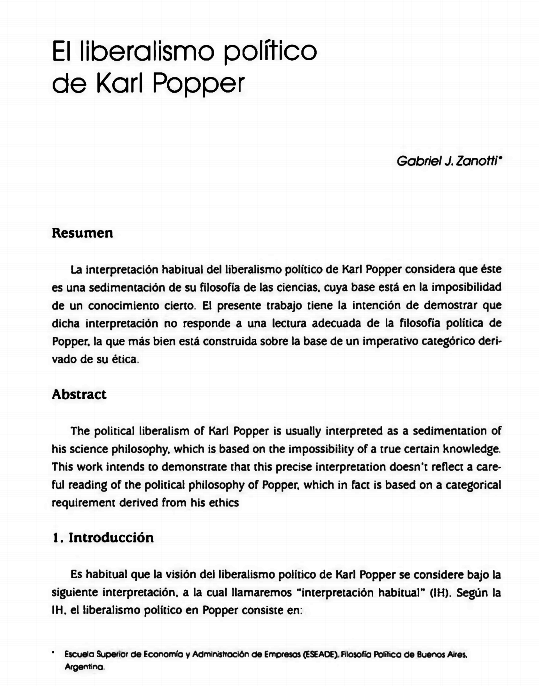The political liberalism of Karl Popper
DOI:
https://doi.org/10.35319/lajed.20079379Keywords:
liberalism, political philosophyAbstract
The political liberalism of Karl Popper is usually interpreted as a sedimentation of his science philosophy, which is based on the impossibility of a true certain Knowledge. This work intends to demonstrate that this precise interpretation doesn't reflect a careful reading of the political philosophy of Popper, which in fact is based on a categorical requirement derived from his ethics.
Downloads
References
Artigas, M. 1988. Lógica y ética en Karl Popper. Pamplona: Eunsa.
Corcó Juviñá, J. 1955. Novedades en el universo: la cosmovisión emergentista de Karl R. Popper. Pamplona: Eunsa.
Gallo, E. 1987. “La tradición del orden social espontáneo David Hume. Adam Smith y David Ferguson”. Libertas N°. 6.
Hayek, F. A. von. 1979. “Scientism and the Study of Society”. En: The Counter Revolution of Science. Indianápolis: Liberty Press.
----------. 1975 Los fundamentos de la libertad. Madrid: Unión Editorial.
----------. 1973, 1976 y 1982 Derecho, legislación y libertad. Madrid: Unión Editorial.
Jasay, A. 1997. Against Politics. London and New York:Routledge.
Kuhn, T. 2000. The Road Since Structure. Chicago University Press.
Lakatos, I. 1989. La metodología de los programas de investigación científica, Madrid: Alianza.
Miller, D.W. (ed.) 1985. Popper Selections. Princeton University Press.
Popper, K. 1969. “The Theory of Complex Phenomena”. En Studies in Philosophy. Politics and Economics. University of Chicago Press.
----------. 1971. The Open Society and Its Enemies. Princeton University Press.
----------. 1974. “Replies to my critics” in: P. Arthur Schilpp (ed.) The Philosophy of Karl Popper. Part II Illinois: Lasalle.
----------. 1978. Lógica das ciencias sociais. Editora Universidade de Brasilia.
----------. 1983. Conjeturas y refutaciones. Barcelona: Paidós.
----------. 1984. Sociedad abierta: universo abierto. Madrid: Tecnos.
----------. 1985a. Teoría cuántica y el cisma en física. Madrid: Tecnos.
----------. 1985b. Realismo y el objetivo de la ciencia. Madrid: Tecnos.
----------. 1985c. Búsqueda sin término. Madrid: Tecnos.
----------. 1985d. La lógica de la investigación científica. Madrid: Tecnos.
----------. 1986. El universo abierto. Madrid: Tecnos
----------. 1987. La miseria del historicismo. Madrid: Alianza Ed.
----------. 1988. Conocimiento objetivo. Madrid: Tecnos.
----------. 1992. Un mundo de propensiones. Madrid: Tecnos.
----------. 1994a. The Myth of the Framework. London and New York: Routledge.
----------. 1994b. In Search of a Better World. London and New York: Routledge.
----------. 1997a. The Lesson of this Century. London and New York: Routledge.
----------. 1997b. El cuerpo y la mente. España: Paidós.
----------. 1998. The World of Parmenides. London and New York: Routledge.
----------. 1999. All Life is Problem Solvin. London and New York: Routledge.
Popper, K, y K. Lorenz. 1990. O futuro esta aberto. Lisboa: Fragmentos.






